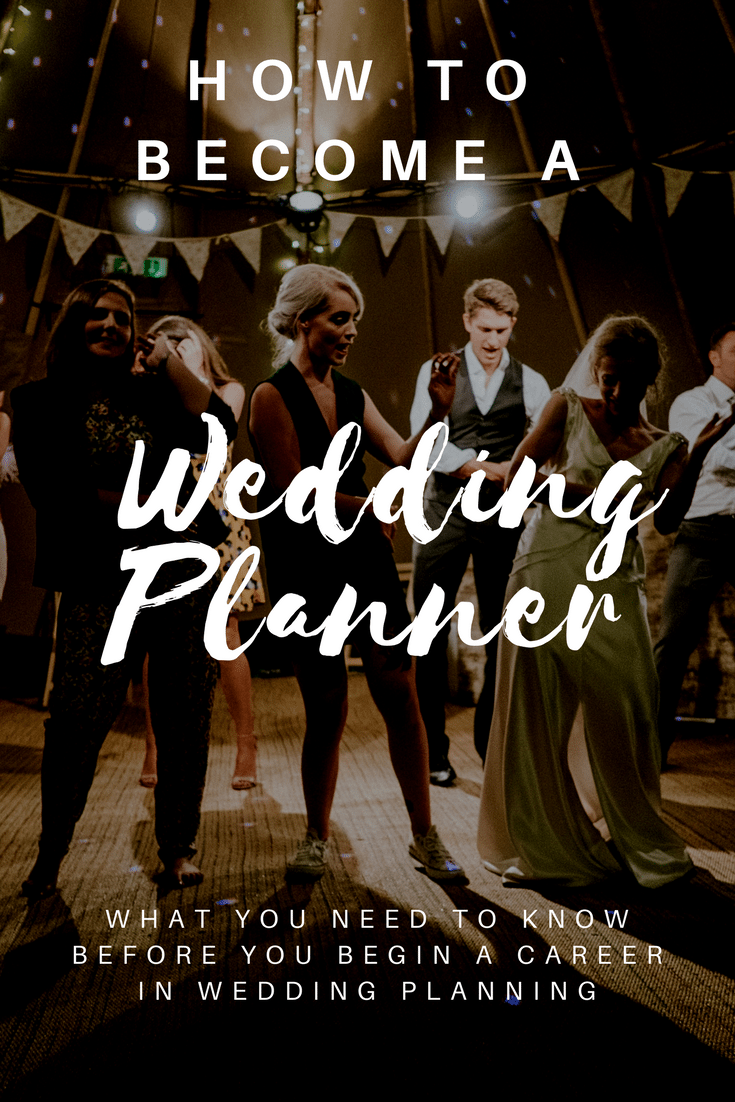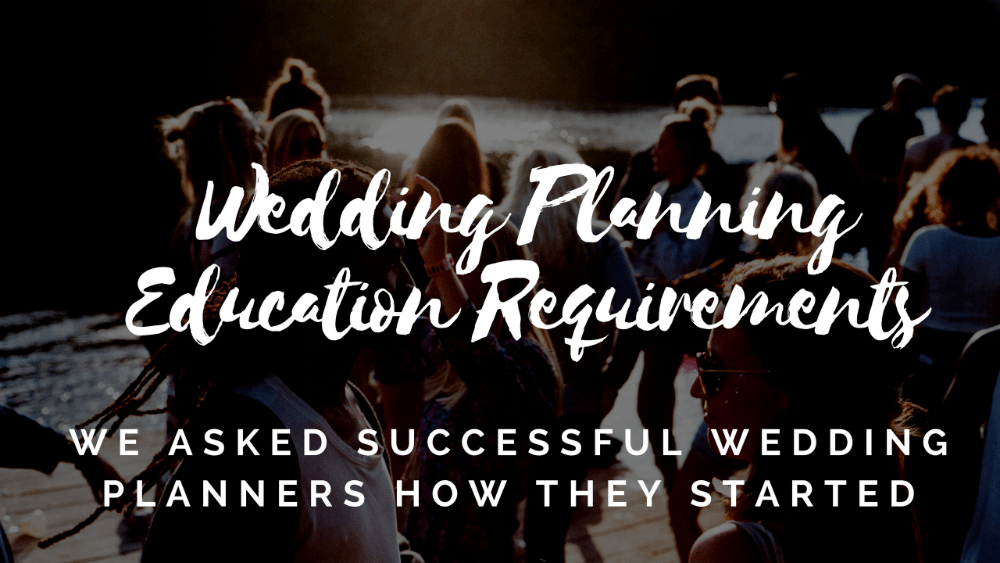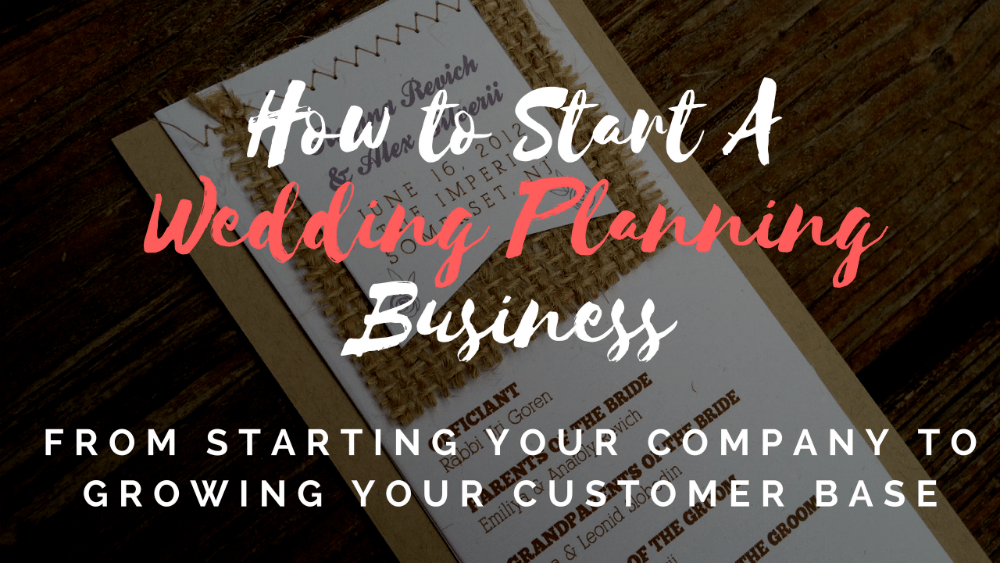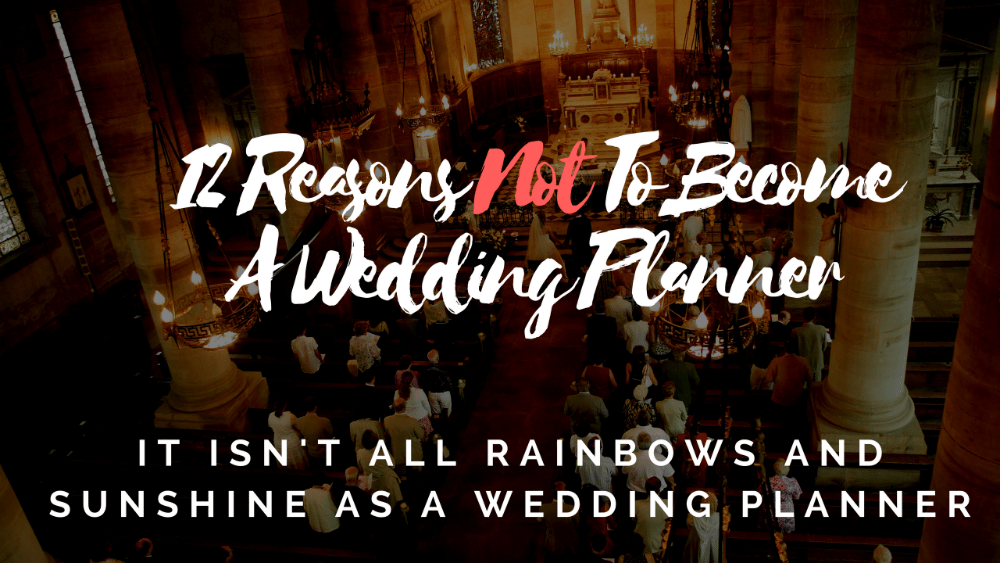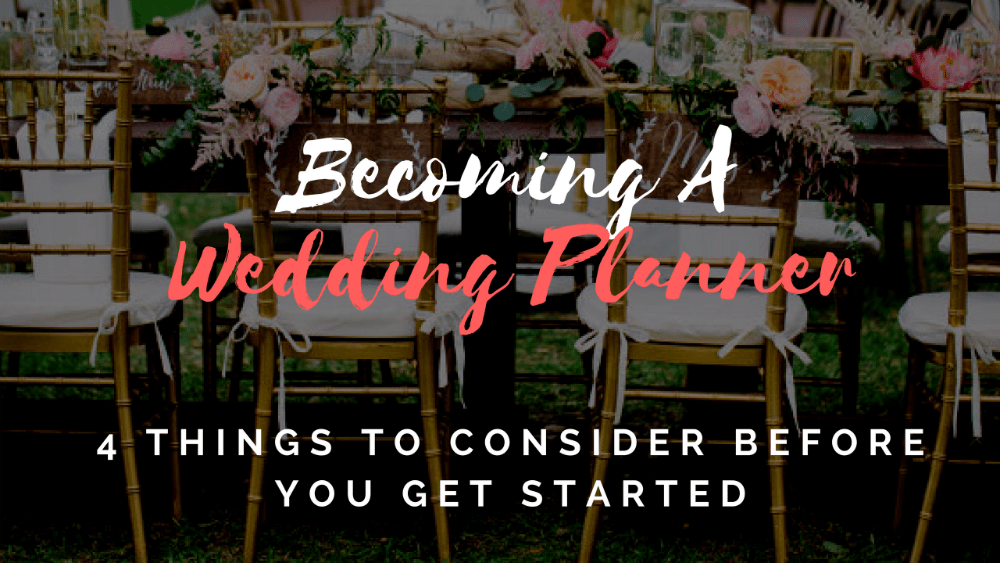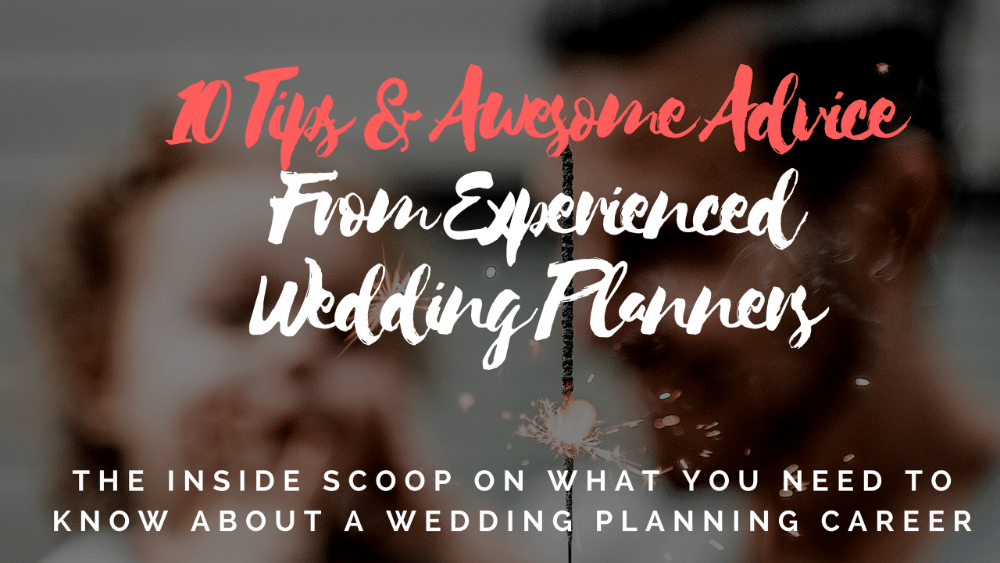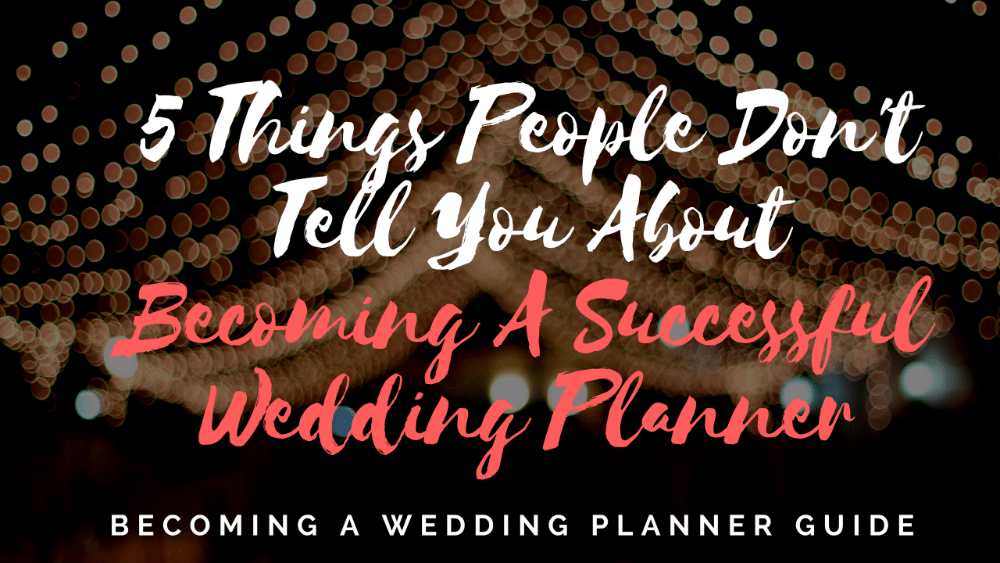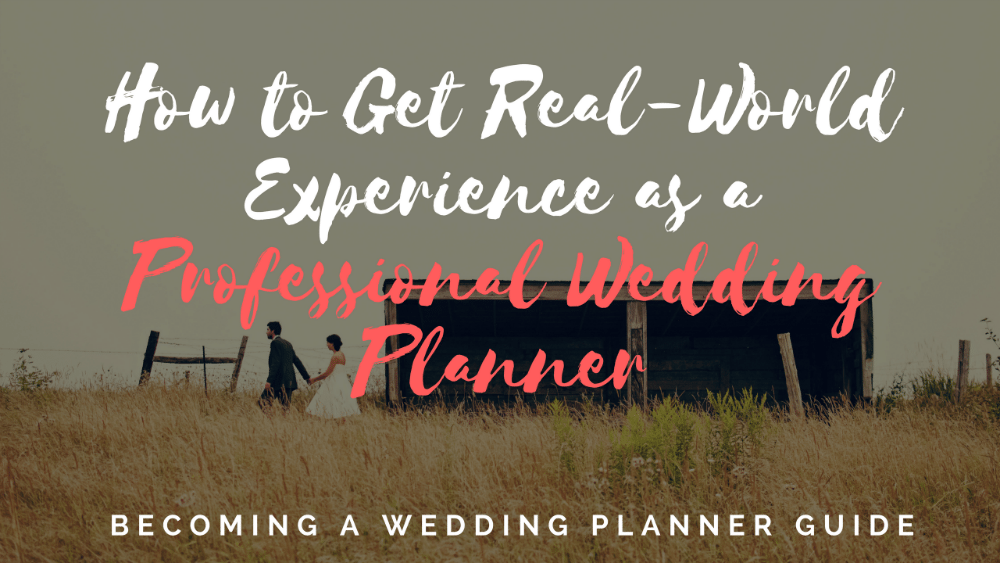How to Become a Wedding Planner – What You Need to Know Before You Begin a Career in Wedding Planning
Do you have what it takes to begin a career in the wedding planning field?
Becoming a successful wedding planner takes more than a business card and a business license. It takes hard work, long hours, determination and self-motivation. Your career goals may start off with a dream but if you’re looking just to merely “party” on the weekends, you’ll have to rethink those aspirations.
For those that are serious, we’ve provided a clear and concise guide on how to get your foot in the door and your hands dirty with all of the essential wedding planner duties.
Content Guide
- Wedding Planner Career Overview
- Is a Wedding Planning Career Right For You?
- Wedding Planning Education Requirements
- Starting Your Professional Wedding Planning Business
- 12 Reasons Not to Become a Wedding Planner
- 4 Things to Consider Before You Get Started As A Wedding Planner
- Advice From Experienced Wedding Planners – 10 Tips
- 5 Things People Don’t Tell You About Becoming A Successful Wedding Planner
- How to Get Real-World Experience & Training as a Wedding Planner
Wedding Planner Career Overview
Working as a wedding planner is often really fun and incredibly rewarding. It involves attending catering and cake tastings, choosing linens and centerpieces, and more fun activities.
Seeing months of hard work come together on a perfect, beautiful wedding day is very rewarding, and among the best experiences planners have in their careers. And there’s great perks, such as being invited to industry parties, going to super-fun conferences and staying at posh hotels while you “tour” event spaces.
It makes sense that a wedding planning career seems quite glamorous, however there are still plenty of reasons why you wouldn’t want the job. Make sure you understand the reality of the career before you dive in head first.
Typical Duties
Don’t let the movies and TV shows fool you into thinking this is a glamorous job. Wedding planning is real, hard work and playing with flowers and drinking champagne makes up about 2% of what you actually do. The rest is straight-up business: negotiating, contacting and following up with vendors, making sure the day-to-day details of running a business happen, etc.
A head for business and head for design is quite necessary, and if you don’t have a “business head,” your wedding planning partner should.
Typical duties of a wedding planning include hiring vendors, working with the bride and groom to make decisions concerning the wedding’s details and making sure the actual wedding day runs smoothly. They keep the celebration on budget and supervise the setup of the party. A wedding planner’s duties are fully encompassing with the day’s events.
Work/Life Balance
Wedding and event planners frequently work in the evenings and on weekends to meet with clients and to coordinate weddings and related events. It’s important to keep in mind that most of your clients work a 9-5 job and will expect to meet and talk with you after work and on the weekends as you plan the wedding together.
Also, U.S. weddings happen on Saturdays, which will keep you busy nearly every weekend, while many of your friends and family have off. However, wedding planners generally take a day or two off during the week to relax.
Certain months of the year are the “busy season” for wedding planners. For example, if you live in the Midwest or northern U.S., you can expect your busy season in the summer. However, if you live in the southern U.S., spring and fall months will be your busiest time.
Dealing with others’ emotions is another aspect to consider. Brides, grooms and their parents can be very emotional during the wedding planning process and on the big day. As their planner, you become their confidant, psychologist and mediator. If you love to help people, are a good listener and know you’ll really care about your clients, wedding planning will be a rewarding career. Brides, grooms and their families rely on their wedding planner to be the voice of reason and the calm throughout the wedding planning storm. But if you foresee this weighing too heavy on your own life and causing you anxiety, it’s best to steer clear.
Besides the schedule and emotional aspects of this career, it also involves hard, physical labor. You can expect to be on your feet for 10-15 hours on the day of the wedding. You might be moving boxes, setting up wedding details, helping with table linens and more. Wedding planners have to be on their “A” game mentally all day, which is often as exhausting if not more exhausting than the physical parts. Yet for many, the reward of seeing all their hard work come together on the wedding day and enjoying praise from clients easily makes it all worth it.
Income Potential
Most successful wedding planners have managed long-term careers due to their passion for event planning and helping brides plan one of the biggest days in their lives. Successful event planners are fueled by passion for what they do and not monetary compensation.
Many wedding planners support themselves and their families with their careers, however becoming incredibly wealthy through such careers is rare. It takes years of hard work to build a reputation and strong business in this field. However, once your reputation and network is solid, you’ll enjoy the rewards of your hard work for years to come.
Demand
The number of wedding planners in the U.S. alone is approximately 10,000. This number encompasses both the hobbyists and professionals because it is a career that you could get into just by purchasing a business license and business card. There are no national requirements or regulations for certification for wedding planners in the US. This lack of regulation also provides the profession with the distinction of having one of the highest attrition rates due to the wrong start in business.
With that being said, people will never stop wanting to get married or have weddings. There will always be a need for good, solid planners that have built up a beautiful resume, portfolio and reputation.
Is a Wedding Planning Career Right For You?
The daily stresses and personalities that come with being a wedding planner can be a lot to take in at first, especially since many envision this career as one filled with lavish parties, clients who love everything the planner does, and unlimited budgets. Yet most of the time, this is the exception, not the rule!
If you’re considering a career as a wedding planner, check out what is required with this line of work, and what comes with it:
Passion and Commitment
One of the biggest differences between a “regular” job and a career as a wedding planner is the time commitment. If you want to thrive financially and professionally as a planner, you need to be available before and after the normal 9-5 work day. Some clients will call you at 9PM and expect instant answers to their burning-est of burning questions. If you’re new to the business and want to create a solid reputation, you need to take calls like these with a smile. And before you say, “No, not me; I’ll set boundaries from the start,” keep in mind that frantic brides won’t always respect such boundaries! An unresponsive wedding planner can make for a very disappointed client, even if the fault wasn’t yours.
If you’re really passionate about being a wedding planner, learn to love the late-night calls and the unscheduled consultations. If you aren’t passionate, you might want to look elsewhere for employment.
Honesty and Integrity
As a wedding planner, most days will consist of interacting with clients, the clients’ family and friends, and assorted vendors. Since you’re speaking with dozens of people for the same event, you’ll likely answer the same question 10 different times one day. Or you could be asked the dreaded “Does this dress make me look fat?” It’s essential to answer questions in a way that is honest but also appropriate to situation and the person. Saying “Yep, that dress totally makes your hips look wide” is not what any client wants to hear, especially when they’re paying you. Try “I do like that dress, but I think this dress may match your personality more and flatters your body type” and similar answers instead.
It’s also important to note some vendors will seek to pay you a commission for promoting their services above competitors. In these situations, remember that you were hired by your client, not the vendor, so you must ensure your recommendation suits your client’s needs and fits their budget. Be willing to put your client’s needs above your own, even if that means making a little less commission from vendors. Reputation is everything in this business, and it’s certainly not worth risking your image over a few extra bucks!
Quick Thinking
As a wedding planner, it’s entirely possible to receive phone calls at 6AM the morning of a wedding from a vendor stating they cannot do what they are contractually obligated to do. People tend to panic when they hear things like this, especially brides, however part of your job as a wedding planner is to remain calm and begin problem-solving immediately. Whatever else, don’t tell the bride unless you absolutely have to. She and her family hired you to handle any situation that arises, not to tell them about every problem and expect a solution. The cake may melt, a dress may not fit, or a vendor might not show up…all of these issues become your issues. And you must address them.
Building relationships with a variety of vendors is imperative, because in addition to expanding your network, you can call one of them at a moment’s notice.
Your biggest job, no matter what little jobs you do here and there, is to ensure clients enjoy their wedding day, and to deal with any problems until the wedding day is over with.
Understanding
Sensitivity is a very necessary part of being a wedding planner. You must be sensitive to needs of numerous people just for one event! Emotions are at a high, tempers flare, tears stream and the wedding planner is often caught in the middle of it all. A calm personality is required, as is being a source of comfort for others. You may deal with a bride and mother in disagreement, family spats, even vendors who do not follow through. There will be times that you want to walk out, or tell everyone exactly where they can put everything, but your top priority is to extinguish fires, not make them worse. It’s not part of your job to point fingers or blame people, but to remain calm and create an enjoyable experience for everyone involved.
Wrap-Up
For some, most of the character traits needed to become an expert wedding planner come naturally. For everyone else, they are skills acquired over time. If you flip out at the idea of a vendor not showing up, fear not. Not everyone has ice water running through their veins, and eventually you’ll learn how to channel these emotions into something productive. Pretty soon your clients will be inquiring how you stayed calm when they felt overwhelmed for most of the day or night. You can beam with pride as you tell them that they won’t need to plan as many weddings as you did to earn that sense of calm!
Wedding Planning Education Requirements
No required certifications or licenses are needed to become a wedding planner in the United States. If you ask 10 successful wedding planners how they started, you will receive 10 different answers!
When thinking about the best way for you to get started, consider your current level of event planning experience. This could be event planning at your current job, church or simply planning parties for family and friends, such as birthdays, weddings and anniversaries. Any prior experience is very helpful when creating a wedding planning career. Business and or marketing experience is a fantastic asset when launching your own business as well.
T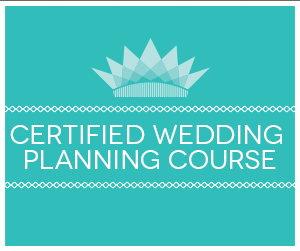
Educate yourself about the business, and try to make your education as well-rounded as possible. While plenty of programs offer the basics, the best way to learn this biz is by doing. Shadow an established wedding planner or obtain an internship. The Association of Bridal Consultants has an internship program for members, as do assorted well-known planners.
And don’t limit yourself to planning–working for a caterer is another great way to gain experience. Even as a member of the wait staff, you can learn what really takes place at a wedding reception. Other options include working for a florist on busy weekends or at a dress shop. Take some photography, floral and cake design classes as well. It’s essential to be knowledgeable in all aspects of weddings–this helps vendors do their job and ensures client happiness.
Again, the wedding planning industry does not feature legal licensing. However, you can take classes or courses to become certified. Be careful how you present your title, as you don’t want to mislead clients. And while you’ll still need to apply for a business license with your city or state, remember there’s no such thing as a wedding planner license.
Starting Your Professional Wedding Planning Business
To be a wedding planner, and to be respected as a professional, there are many benchmarks to be achieved. You must prove a level of experience or training. The bridal consultant is supported by referrals from other wedding professionals and former clients. In order to gain this referral base, you must be able to prove your value. You must show them your training level, your experience within the profession and your ability to make it work.
Registering Your Business
Now that you are in the process of learning about weddings, take the appropriate steps required by your city, county or state to license your business. You’ll want a business name and through your local agencies you’ll be able to find out if your business name is available.
Advertising
When your training is complete, and you are properly registered and licensed as a business, start to investigate advertising for your business. Most major bridal magazines can be costly for the newbie, but, if you can afford it, consider only those having local books for just your area.
Online directories such as Team Wedding, Home of Top Wedding Sites can offer more affordable advertising or even some free wedding advertising.
Do local searches online for keywords such as “wedding planner in (insert state or locality)” or “(your state) weddings” and list with these sites. Some planners do very well with Yellow Pages listings and others do not, but, definitely have a listing in the white pages of the telephone book. In most states, a complimentary listing will get your name and phone number published both online and in the print book.
Consider local bridal shows to exhibit your new business and to network with other vendors as well. These can be an affordable way to generate business, but make sure you go prepared- your booth and presentation is everything at a show!
For most new wedding planners, digital marketing (via Facebook or Google AdWords) is likely going to be the most cost-effective way to find new customers. If you’re out of your element, don’t worry- there are lots of professionals out there. Don’t rush into a relationship: take your time, interview your potential marketing partners, and make sure you pick a great fit for your business.
Website & SEO
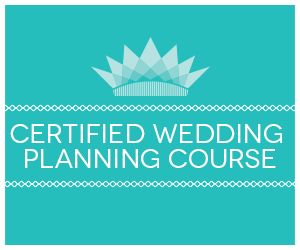
Contact information is a must. List a phone number and your office address or PO Box number. This information will go a long way to provide the bride with the trust factor she craves. If you have some references and pictures, be sure to include these too.
You don’t need to spend thousands on a website either, with amazing website building tools like Weebly you can build a free website that you are proud of in no time. Make sure it makes you appear professional. At the very least, have your own domain name and use it.
Once the website is done, you’ll likely be pressed at some point to look into SEO (search engine optimization). SEO is a long-term strategy and should only be undertaken by those that are serious about growing their business!
Business Cards/Pamphlets
Once the name is registered and you are licensed according to your locality requirements, you’ll want to design a business card to promote your business. Design them in accordance to your own vision and personal style. Clean, trendy and nothing too fussy, you want to present yourself in a professional way and these business cards are a way to make a great first impression.
Along with business cards, you can design some pamphlets too. This is perfect for when you’re set up at a bridal shower and meeting brides face-to-face. You can immediately pass them pamphlets with all your information and not just send them to your website.
Location, Location, Location
Get set up in an office. Optimally, an office separate from your home will seem most professional and will allow you to meet with clients more comfortably, however, many consultants do operate out of their home office, at least at first. You’ll need a computer, printer and fax/scanner set up so that you can send and receive contracts, floor plans, etc. A high speed internet connection is also advised so that you can check email and communicate with your clients. many businesss owners use their cell phone to communicate now. Be sure to check your email as often as possible. Daily is best.Always answer email and any other message within one day, if possible.
Join Associations
Further your professionalism by becoming a member and a part of a professional bridal associations such as American Association of Wedding Professionals, June Wedding Inc., ACPWC, and AFWPI With a reputable association you will be offered membership so that you can remain on top of wedding trends and continue your education.
Go Out There And Get Your Wedding And Event Planning Business Going
If you aren’t ready to become a wedding planner now, at least you know how to get started. If you are still in school or college, I highly recommend that you take some business management and marketing courses. Also, if you can get into any courses offered for the hospitality industry, these will prove to be very valuable. While in school, and possibly working part time, try to align yourself with a job that can get you experience in the field. Intern for a local wedding planner. Work for a caterer, florist, hotel or bridal shop. It never hurts to know more about this business and will contribute to your overall professionalism.
Recommended Client-Facing Documentation
- Client services agreement (contract)
- Scope of work
- Liability agreement
- Sales document that outlines pricing, payment terms, dates, etc.
12 Reasons Not to Become a Wedding Planner
Working as a wedding planner is often really fun and incredibly rewarding. It involves attending catering and cake tastings, choosing linens and centerpieces, and more fun activities. Seeing months of hard work come together on a perfect, beautiful wedding day is very rewarding, and among the best experiences planners have in their careers. And there’s great perks, such as being invited to industry parties, going to super-fun conferences and staying at posh hotels while you “tour” event spaces. They also get to work with wonderful clients on one of the most important days in their lives.
It makes sense that a wedding planning career seems quite glamorous, however there are still plenty of reasons why you wouldn’t want the job. With that in mind, check out 12 things to seriously, seriously consider before you start a career as a wedding planner:
Evening and Weekend Work
Weekend events and evening client meetings mean time away from family and friends. Being a wedding planner equals a work schedule that’s all over the darn place–forget “9 to 5,” because it’s not happening. If you own your business, you can set time boundaries to help with this and even plan other types of events to create a more balanced schedule. However, the reality is 95% of weddings happen on Saturdays and many of your clients need to meet after their work days to discuss plans.
Hard Work–Both Physical and Mental
Working on the wedding day is hard work. You’ll spend 10-15 hours on your feet and need to be mentally “on” no matter what. Even if your physical prowess and mental capabilities are awesome, the day still takes its toll. It’s important to remember this when considering this career.
Wedding “Hangover”
This refers to how you feel the day after a wedding–it’s like you ran a marathon, then went out drinking all night. You’re going to be dehydrated, sore and tired from working a wedding (see #2).
Difficult Clients
Sure, you’ll try to avoid clients who aren’t ideal, however, there will be some who slip through the proverbial cracks. Having difficult clients can take a serious mental toll–it’s already a stressful job, and when you add difficult clients to that, you will undoubtedly question why you chose this career. It’s important to walk away from the wrong client when you know something isn’t going to end well.
It’s Not Your Wedding
Working with clients means making THEIR dream come true, not yours! This is a challenge for some event planners who want to keep rehashing their own wedding or trying to convince clients to go with their vision only. Part of wedding planning is working on weddings that are not your style or taste–and you need to be okay with that.
The Emotional Connection
Wedding planning is an intense industry! You’re dealing emotional brides and emotional family members on a very emotional day. Many planners grow close to their clients which means you work even harder–not that this is a bad thing! However, it’s difficult not to take it personally if something goes wrong or your clients are not 100% happy with your services or ideas. If you get your feelings hurt easily, you might want to avoid this business.
Saint-like Patience
If lacking patience, determination and thick skin, this isn’t the career for you. That’s not to say it won’t take a few years before you’re comfortable in your business and comfortable working with all kinds of brides. It will also take a few more years to get your reputation established, make a good living, and start seeing referrals.
You Aren’t a “People Person”
Planners work with a wide variety of clients and vendors. The wedding industry is very social and being a planner is probably the most social job in the industry. If you are shy, introverted or otherwise dislike people, being a planner could prove very difficult. This isn’t to say that you can’t overcome your social issues, but it’s something to think about. Being an event planner may be the encouragement you need to deal with shyness and related fears.
Ego
Confidence is an important part of being a wedding planner. An enormous ego is not.
Multi-Tasking and Organization
Being a wedding planner means multi-tasking and staying organized. Seriously organized. Not only do you have to remember each of the million things on your mind, you have to think and act quickly. When engaged in the planning process, you might be working with 10-20 different couples at a time. If you aren’t extremely organized, it will become apparent.
The Stress
Being an event coordinator was just listed on Forbes.com as the 6th most stressful career–that’s out of ALL careers! If you live to problem-solve, remain cool under pressure, and actually thrive under pressure, this is the job for you. If you don’t handle stress well…you may want to think of something else to do for work!
No Passion
Don’t do it unless you’re passionate about it–whatever it is! To be successful and thrive as a planner or as anything else, you need to LOVE what you do. Many planners make serious sacrifices to be successful, which doesn’t happen without serious passion. Integrity is just as important. Remember that!
Yes, this is the not-so-glamorous side of wedding planning. If you’re willing to take the bad with the good, go for it!
4 Things to Consider Before You Get Started As A Wedding Planner
Google receives thousands of “how to become a wedding planner” searches each month, while many colleges and universities are considering adding certificate and degree to their course lists. If you’re among those considering a career in wedding planning, check out a few things you should think about before you get started:
Does Wedding Planning Fit Into My Lifestyle?
Wedding and event planners frequently work in the evenings and on weekends to meet with clients and to coordinate weddings and related events. Most of your clients work a 9-5 job and will expect to meet and talk with you after work and on the weekends as you plan the wedding together. Most U.S. weddings happen on Saturdays, which will keep you busy while many of your friends and family have off. However, wedding planners generally take a day or two off during the week to relax.
Certain months of the year are the “busy season” for wedding planners. For example, if you live in the Midwest or northern U.S., you can expect your busy season in the summer. If you live in the southern U.S., spring and fall months will be your busiest time.
Dealing with emotions (not yours) is another aspect to consider. Brides, grooms and their parents can be very emotional during the wedding planning process and on the big day. As their planner, you become their confidant, psychologist and mediator. If you love to help people, are a good listener and know you’ll really care about your clients, wedding planning. will be a rewarding career. Brides, grooms and their families rely on their wedding planner to be the voice of reason and the calm throughout the wedding planning storm.
Besides the schedule and emotional aspects of this career, it also involves hard, physical labor. You can expect to be on your feet for 10-15 hours on the day of the wedding. You might be moving boxes, setting up wedding details, helping with table linens, etc. Wedding planners have to be on their “A” game mentally all day, which is often as exhausting if not more exhausting than physical labor. Yet for many, the reward of seeing all their hard work come together on the wedding day and enjoying praise from clients easily makes it all worth it.
What Classes and Certificates Are Needed?
No required certifications or licenses are needed to become a wedding planner in the United States. If you ask 10 successful wedding planners how they started, you will receive 10 different answers!
When thinking about the best way for you to get started, consider your current level of event planning experience. This could be event planning at your current job, church or simply planning parties for family and friends, such as birthdays, weddings and anniversaries. Any prior experience is very helpful when creating a wedding planning career. Business and or marketing experience is a fantastic asset when launching your own business as well.
Take inventory of your experience, then evaluate the many, many education options available. Think mentoring programs, community college classes, wedding planner conferences… you get the idea.
Am I Really Just Doing This For the Money?
Most successful wedding planners have managed long-term careers due to their passion for event planning and helping brides plan one of the biggest days in their lives. Successful event planners are fueled by passion for what they do, not monetary compensation. Many wedding planners support themselves and their families with their careers, however becoming super-duper wealthy through such careers is rare. It takes years of hard work to build a reputation and strong business in this field. However, once your reputation and network is solid, you’ll enjoy the rewards of your hard work for years upon years.
Will I Be Ready for Everything I Have to Learn?
Some people plan their own wedding and decide its what they want for their career. Yet there’s a big, big difference between planning your own wedding and working with a paying client to plan their wedding. Planning weddings for a living requires understanding and knowledge of:
- Family dynamics
- Reputable vendors
- Wedding day coordination
- Detailed and correct timeline creation
- Budget creation and management
- Contract review
- And much more
In addition to understanding the details of planning the actual wedding, the many elements of starting and running your own business also require consideration. Aside from having the correct licenses and insurance, you’ll also need to market your business, determine pricing, invoice and bill clients, attend networking events, balance your books, know where to advertise, learn how to hire staff, and more. And more.
Advice From Experienced Wedding Planners – 10 Tips
Embarking on a career in wedding planning? The following tips, or “lessons,” will certainly be of help. Even if you’re well into your career as a wedding planner, you can still benefit from these tips. Enjoy!
Do the Education Thing
Who really does know what they’re doing when they start a job? Very few people, and that’s okay. Educate yourself about the business, and try to make your education as well-rounded as possible. While plenty of programs offer the basics, the best way to learn this biz is by doing. Shadow an established wedding planner or obtain an internship. The Association of Bridal Consultants has an internship program for members, as do assorted well-known planners. And don’t limit yourself to planning–working for a caterer is another great way to gain experience. Even as a member of the wait staff, you can learn what really takes place at a wedding reception. Other options include working for a florist on busy weekends or at a dress shop. Take some photography, floral and cake design classes as well. It’s essential to be knowledgeable in all aspects of weddings–this helps vendors do their job and ensures client happiness.
Detach Those Preferences
You pretty much have to take your own opinions, likes and dislikes out of the picture when you work as a wedding planner. No matter how many brides you deal with with taste like yours, you’re still going to work for those whose selections make you throw up in your mouth. Colors, style, theme, whatever – you must put aside your own feelings and provide the couple with what they want.
Understand How NOT Glamorous the Job Is
Don’t let movies and TV shows fool you into thinking this is a glamorous job. Wedding planning is HARD work and playing with flowers and drinking champagne makes up about 2% of what you actually do. The rest is straight-up business: negotiating, contacting and following up with vendors, making sure the day-to-day details of running a business happen, etc. A head for business and head for design is quite necessary, and if you don’t have a “business head,” your wedding planning partner should.
Certification Vs. License?
The wedding planning industry does not feature legal licensing. However, you can take classes or courses to become certified. Be careful how you present your title, as you don’t want to mislead clients. And while you’ll still need to apply for a business license with your city or state, remember there’s no such thing as a wedding planner license.
Remember to Research
When performing market research, reach out to other planners via legitimate channels and ask for help. Do NOT ‘secret shop’ other planners in your area–they won’t be happy about it. Attend networking events and find colleagues who will exchange information with you instead!
Have Patience
Everything has its own time. It’ll be several years before you feel comfortable as a wedding planner, and that’s perfectly fine–everyone has to start somewhere! And don’t expect more experienced planners to hand you what they have worked so very hard for. While many will be willing to help, it’s not appropriate to think they’ll spill trade secrets.
Find Your Voice!
Find a way to be unique and separate yourself from your competitors. Try writing your website and package information in a “creative bubble”–don’t look at anyone else’s site for at least two weeks and go from there. That way you’re starting fresh and won’t “copy” other people’s work. After all, you need to be able to define what you do without outside influence.
Be Creative
Okay, you may not have any photos from events you’ve worked because you haven’t been hired by anyone yet, but for God’s sake don’t use stock photos. That implies it’s your work, and it’s not. Take pictures of flowers, make tablescapes in your dining room, or leave your site’s image gallery empty until you can fill it. You can also find an up-and-coming photographer also looking for exposure and stage some shots.
Pricing = Balancing
Yes, your prices should be less than someone who’s been in the business for years, but that doesn’t mean you have to under-cut. If all other local wedding planners are charging $1500 for wedding weekend/day of coordination and you are charging $250–well, you’re hurting the industry and your business. Get an idea of the market and create prices from there. Also be cautious when clients ask for a discount, as negotiation is part of being a planner. If you lower your prices at a client’s request, you’re saying you weren’t worth what you were originally charging.
Trust Your Gut
You’re not going to get along well with every client, and some just aren’t worth it for you. This is a hard lesson to learn, but an important one. It’s easy to take any client who comes your way when first starting out, as you need to gain experience and build your portfolio. This happens even when your gut is telling you to run screaming from the room. Learn how to trust yourself when you know someone isn’t a good fit for you. If the “this person is a wing nut” bells go off or you don’t like someone the moment you meet them, it’s not going to get better. In fact, it will get worse. Much worse. Learning to turn away business is as important as learning how to manage your business.
5 Things People Don’t Tell You About Becoming A Successful Wedding Planner
Considering a career as a wedding planner? Whether fresh out of college or pondering a career change, you’ll want to think long and hard before getting started in the wedding business. It can take years to establish yourself, though once you do you’re usually golden! Here are five things people don’t tell you about becoming a wedding planner and starting a wedding planning business:
Image
Yes, this is a bit shallow. However, people tend to “size up” others they’re meeting for the first time before anyone opens their mouth! We often do this without even being aware of it. Brides do it too–they have a preconceived notion of what a wedding planner should look like. It therefore follows that your overall image needs to be sharp, chic and up-to-date.
Professionalism
This is how you win the respect of your peers and clients. Maintaining a sense of calm and a professional demeanor at all times is essential to your reputation. This doesn’t just refer to the actual wedding, and all the meetings before that, rather it’s something to maintain every single day. People will start to take notice when you enter the room thanks to your professional ‘tude. After all, you never know where you might meet your next client!
Organization
Organization is one of the most important parts of a wedding planning! If planning more than one wedding, it’s highly necessary to have a system and use it. Every bride wants and deserves to be special, and every bride needs reassurance she’s in good hands. It’s your job to make her feel that way. If you don’t implement a system and stick to it, you’ll be fighting an uphill battle during every wedding you plan. Besides, organization equals client thank-you’s, and you’ll thank yourself too! Use an “old-fashioned” calendar, a mobile device, or anything else that works for you.
Passion
It’s important to love your job, no matter what it is! However, wedding planning is absolutely a fun business to be in. You have a flexible schedule, can take off and go to lunch with partners and friends, go shopping in the middle of the day, etc. In addition to doing all of these things, the most successful planners work on their business all the time. They work nights and weekends, and often keep strange hours. But they’re passionate. It’s not work, because they love it. If you don’t have passion for the wedding business, you might want to think of another career to try!
Success
Part of playing the role is becoming the role! If you truly feel and believe you are successful, other people will believe it too. Get up every morning, look yourself in the mirror and say out loud, “I am a wedding planner, YES!” It’ll become second nature!
If you love it, it’s worth working hard for. Good luck!
How to Get Real-World Experience & Training as a Wedding Planner
How To: Be a Wedding Planner
One of the questions wedding planners are frequently asked is how to get started in the wedding planning industry. Ah, where to begin! It’s a different journey for everyone, however a few wedding planner tips are quite universal:
Get Experience
The first thing to do is to gain some real-world job experience, whatever the industry. Learning how to behave professionally and be respectful of coworkers and colleagues are skills that EVERYONE should have, no matter what the occupation. Becoming a strong writer is very important as well, as you’ll be emailing a lot among other things. Start your emails with a greeting, and remember to use capital letters, perform a spell check, and sign each email with a closing.
Real-world job experience is helpful as it exposes you to a variety of people and how an office works. Many wedding planners are sole proprietors, meaning they’re the boss and may only have a few people working for them, if any. Most planners do not have full time employees but rather rely on people to work for them on an hourly basis as needed, such as on-site during events. Not all planners can afford to have full-time staff, so these jobs are often few and far between. However, when looking for a new hire, established planners generally look for people with real-world experience.
Corporate event planning experience is fantastic training for a career in the wedding planning industry. Many planners got started by working corporate events! Note that a job title may not necessarily say “Event Planner” but can involve event planning skills. Think jobs in marketing, business development, and public relations, all of which can provide exposure to event planning.
Offer Your Time!
It’s entirely possible to keep your day job while gaining experience in the wedding planning industry. Take advantage of your evenings and weekends to volunteer for a wedding planner, or help out with charity events. While many opportunities like these are unpaid, they’re still fantastic in helping you obtain the experience you need.
So How About Finding These Opportunities?
Do some research to find out about the wedding planners are in your area. They don’t necessarily have to be the “top” planners in the city or region, however it’s still recommended you work with planners who have been in business for several years. It’s also recommended you choose ones affiliated with a bridal association. You can find planners in your area by looking at the vendor lists of sites such as Style Me Pretty. Other options include websites such as theknot.com and weddingchannel.com. Resource “libraries” with retail store fronts such as The Wedding Library in New York City and The Bridal Bar in Los Angeles, San Diego and Atlanta are good places to look for volunteer, intern and job opportunities.
Don’t forget that other vendors are also excellent knowledge sources! For example, working for a floral designer or a caterer can provide the fantastic experience and exposure you need.
Networking and Education
The best way though to find job opportunities is through the aforementioned associations in the wedding and special event industries. Many of these organizations have educational programs and events designed for those who want to get started in the wedding industry.
Do your homework! Try to join an organization with a local chapter in your area if possible. Numerous great local networking organizations are helpful. You can also check your local colleges, particularly their adult education or extended education departments, to see what educational/certificate opportunities are available in event planning.
Remaining active in networking and educational programs helps your resume stand out from others when applying for wedding planning jobs. It shows that you’ve done your research and are dedicated to learning more about the industry. Additionally, attending networking events and participating in educational programs allows you to meet people who know of job leads or volunteer opportunities. Collect business cards and stay in touch with these people – you never know when they or someone they know might have an opportunity! What’s great about these educational programs and networking events is many happen in the evening, or are work-from-home, which allows you to explore and pursue your interests if you have another job or are transitioning to another career.
Reading is Important–Very Important!
If you want to be a wedding planner but don’t enjoy reading, you’re missing out. Besides, most wedding planning books, websites and blogs are image-tastic! The amount of information out there is truly amazing, so there’s no excuse to not read as much as your schedule allows.
If you hope to start your own business at some point, there’s no time like right now to learn as much as you can. Books, websites, blogs….plenty of info is out there regarding how to start or run your wedding planning business.
Now, you of course still need real-world experience!
What are some of the skills required? What should you know? As someone once said, “Wedding planning is not for the faint of heart.” It’s not easy. If you don’t handle pressure well or don’t like surprises, it is doubtful you will like this career. However, if you thrive on chaos, know how to put out proverbial (and maybe a few literal) fires, and can juggle many different tasks at once, you likely have some of the skills you need to succeed. First, and perhaps most essential, you’re a project manager – you’re managing many different people, details, and usually different priorities. You also deal with a lot of different personalities–brides, vendors, family members, other hired help…
Effective time management is a necessary skill–this includes your time and the time of your clients. Wedding day timelines are great for this. You also need a thick skin–learn not to take everything personally. Remember, you’re doing business, and that’s it, and that’s all.
Other requirements include excellent financial planning skills, as you’ll need to know how to create and stick to a budget. Patience is a virtue for a reason, and very important in the wedding planning industry. One saying about wedding planners states, “A wedding planner is a mother, sister, friend, drill sergeant and psychologist.” Boy, is this true!



